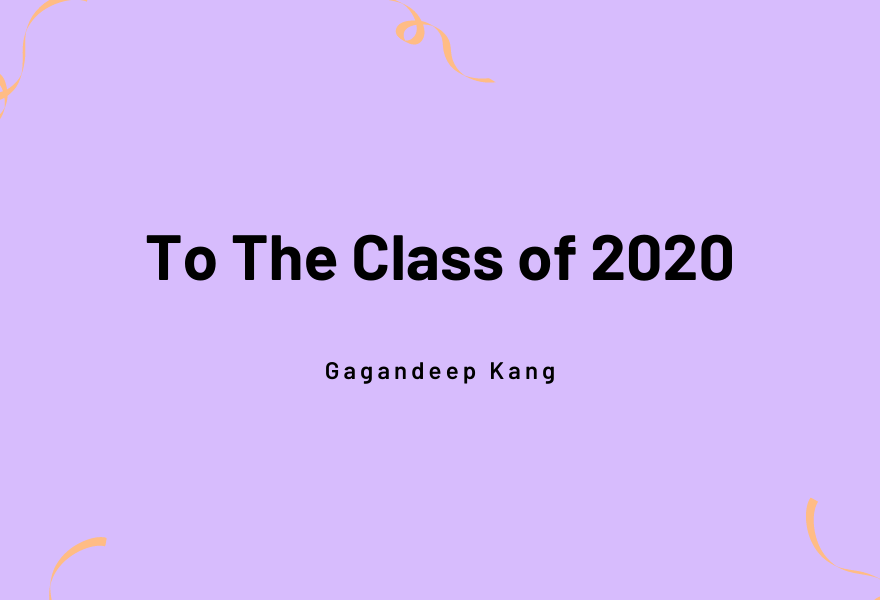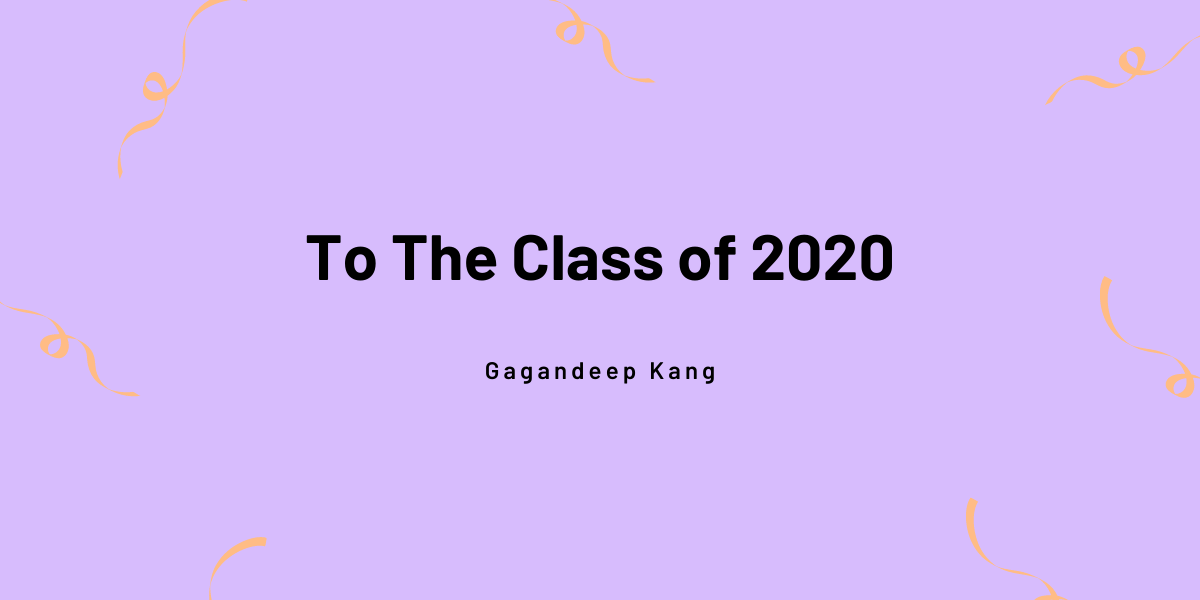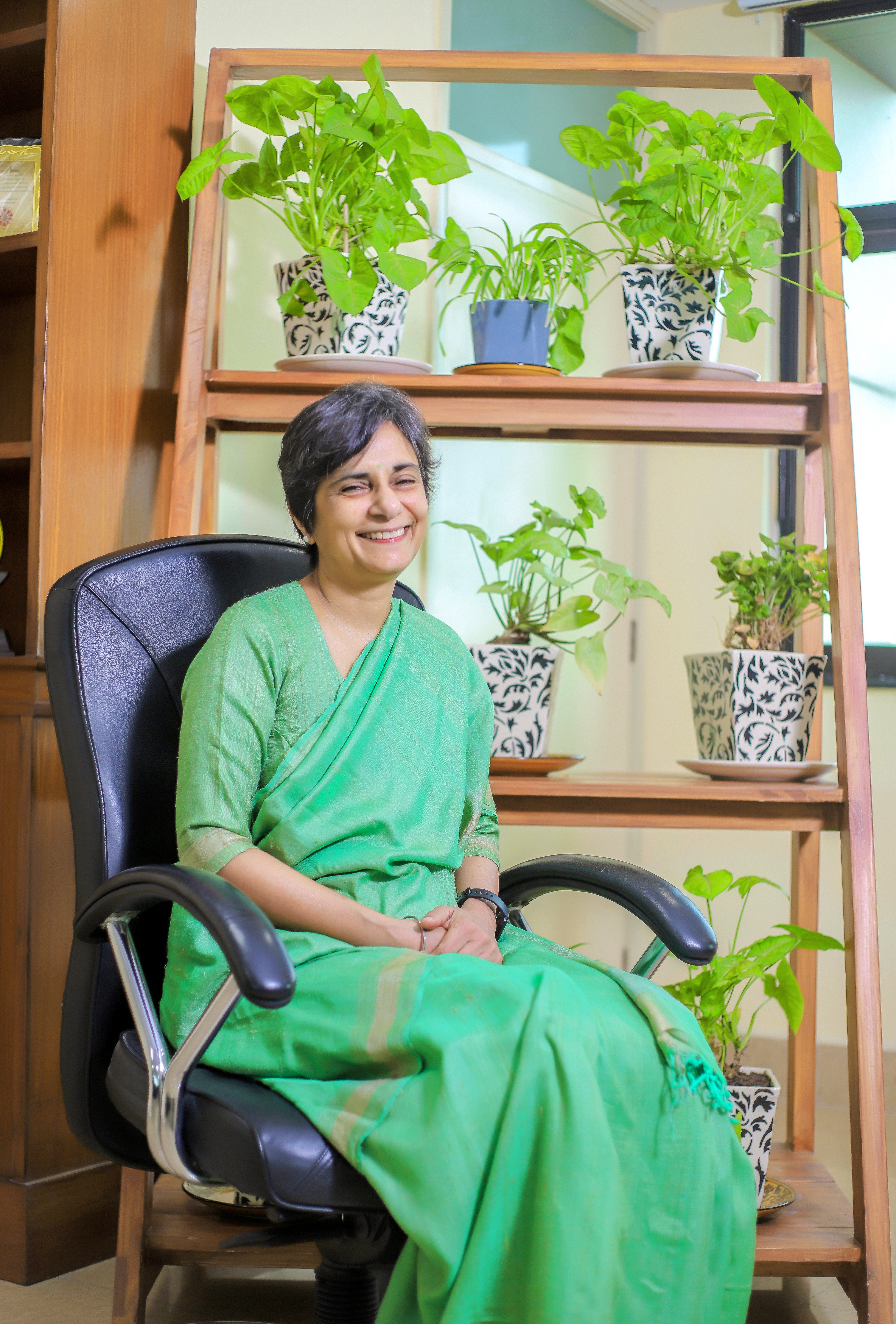Handling the Communications work for the institute, one of my responsibilities has been to listen to and document what our people say at public events. I have learned a lot, lot, lot only by listening to these fantastic people. More so when it is Dr. Gagandeep Kang. All of us know her to be an excellent speaker. She is someone who says just the right words that make an impact by not taking too much time and space. I share with you all this wonderful and timely address that she delivered at the convocation for IIIT, Hyderabad’s class of 2020. The reason I share this with you all is, this address carries messages every student needs to hear. Especially now.
“This is an extraordinary year. Maybe we don’t want it to be quite so special, but you are a very special class.
This is not a time that any of you will forget. Whether or not you know it now, it has changed you and it has shaped you. The coming years will determine how you will look back on the impact that this defining time has had on your lives. You have worked hard, and you’ve succeeded, and you’re graduating today. But the success and this graduation is nothing like what you and your families thought it was going to be when the year started. I’m sure you expected that having come so far, having reaped the rewards of a degree from an outstanding institution, having the prospects of good jobs and great futures, there would be so much to celebrate for you and your families that have supported you in your journey and brought you to the threshold of the next stage of your life. And while these times are different, it doesn’t change the fact that you are achievers. Your effort and struggle have all resulted in your success.
Looking forward to these uncertain times, what does the future hold for you? Obviously, these are difficult times. You don’t know when you will be able to move forward. You don’t know what challenges you will encounter. What might the time frame for action be? There is a lack of predictability and, therefore, a lack of ability to plan and to control. But there are many things that you can do.
At the turn of the century, we looked at the world around us, and we developed the Millennium Development Goals. These were ambitious approaches to decrease deaths and improve living conditions around the world by 2015. We did not succeed in every country, achieving the MDGs, but we made a lot of progress. We had not thought that possible. All United Nations member states then recognized the importance of shared values and commitment and came together to develop the Sustainable Development Goals that are also known as the Global Goals. These are a universal call to action, to end poverty, to protect the planet, and to ensure that all people enjoy peace and prosperity by 2030. An important aspect of the 17 sustainable development goals is that they are integrated. That they recognize that action in one area will affect the outcomes in others. That development must balance social, economic, and environmental sustainability. The COVID-19 pandemic has made it clear that human action, nature, and economies are connected.
In the past few months, every part of the world from New York to New Delhi from Tromsø to Timbuktu has been affected, underlining our connectedness, our interdependency, and the need for a universal agenda as in the SDGs to build a resilient and inclusive future that sustains and restores our natural environment.
This is the biggest acute health crisis in modern times. It will push the vulnerable into poverty. It will destroy jobs once considered secure. And it will damage most, the poorest and the most vulnerable. But there is a silver lining. We understand now that unsustainable ways of living are not tenable anymore. That response must be integrated. That linear process will not work. And that we will need systems-level thinking and creative solutions that will come from the iterative process to get us back on track for the SDGs.
Everyone is needed to contribute to reaching these ambitious targets. The creativity, know-how, technology and financial resources from all of society are going to be required. At no other time has it been so obvious that we need to work together and build together to shape our collective futures.
Crises expose the strengths and weaknesses of society. It is a hard truth that those who are in leadership positions sometimes operate with incomplete information and make decisions that are, in hindsight, not effective or appropriate. And sometimes, leaders step up, communicate clearly and transparently and build trust on moving forward together.
Living through these difficult times tests us, challenges us, and makes us either grow or falter. If we look to the future, it seems likely that it will not be at all like the past. Our priorities and our perceptions have changed. But with all the fear, the unknown, and the isolation, we have actually never lived in a time when we have had so many tools to solve problems. We have resources. We have the technology. We have skills, and we have talents that can help us to a road map to remake the world
Think about who and what matters in the world today and what you want to see more of.
In today’s uncertain world, we wait eagerly for stories of vaccines and breakthrough drugs. Science has never been followed quite so much. We look at new communication tools, new tracking tools, and as Professor Reddy said, new applications for public health, new mathematical models for predicting the future. As a society, we think that science and technology are going to save us and it will.
We can, and we will make the world a better place and not just for ourselves alone. While we wait for the immediate crisis to settle and for the world to evolve its way into a new way of functioning, I want to leave you with three actions for these times using words from a leader I find inspirational and some have found imperfect.
Seek out new perspectives.
Look and listen to what other voices are saying. Reflect on them. And then define for yourself what your core values are and what matters to you.
Mahatma Gandhi said, understand, and embrace your values because they become your destiny. If you think about answering these three questions:
What defined the times when you were most happy?
What defined the times when you were most proud?
What defined the times when you felt most fulfilled?
These will provide a sense of who you are and where you should go.
There is no right; there is no wrong. Some people revel in achievement. Some people revel in connection. Some people like to overcome hard times. That is what defines who you are.
Think positively. It’s easy to get into a negative spiral of fear and consequent exclusion. Mahatma Gandhi said that fear of the disease killed more men than the disease itself. Fear makes us blind, and evidence brings light and vision. Focus on what we know, what we are learning, and you will see that there is a path forward. That there are ways that we can contribute. With your intellect and your talent backed with courage, perseverance, and humility, every problem can be addressed in helping others in addressing problems that are bigger than just our own. We realize that we are part of a bigger whole and that together we can build solutions for a better tomorrow. It will not be easy. We will struggle, but nothing worth having comes easily. Uniting for a common goal will keep us going and give us hope. Reach out and make connections. In an uncertain world, connections with friends, families, and colleagues make us realize that we are all experiencing this together. You will find people who are strong who act as role models who inspire and who lead. Follow them. And there are people who struggle, people who have difficulty coping, who need support. Be there for them.
Mahatma Gandhi said that the true measure of a society could be found in how it treats its most vulnerable members. Look at yourselves, your families, your friends. The world of relationships that you have. Think about how much they matter and what you can do to strengthen them. This is your safety net. Your support system and your insurance for difficult and uncertain times. And just as much as everyone around you is your safety net, you are theirs.
In times like this, thinking through what really matters to us is important. And while the first circle is ourselves, families and friends, outside that are many more spheres of influence that affect us and that we can affect.
It has become obvious around the world that no matter how much we separate ourselves, we do live in a deeply interconnected world where it may be possible some of the time for some of us to separate ourselves from other people and their problems. But not forever.
Deep-seated inequity and disparity that affects some parts of the world influence how the rest of the world functions. In many ways and not just when there are infectious diseases around.
Your institution aims at transforming industry and society by delivering research-led education, promoting innovation, and fostering human values. Your abilities and skills are foundational to building your careers and to changing the world. You have the opportunity to be the change.
Go out and seize the day.
Jai Hind.”
Watch the complete convocation ceremony here.



